You found our list of top business ethics books.
Business ethics books are guides that cover the moral aspects of industry. These books often work through example ethical dilemmas likely to arise in the professional world, and also cover topics such as leadership, truth in advertising, whistle blowing, health and safety in the workplace, treatment of employees, corporate espionage, and enacting agreements. The purpose of these guides is to prepare professionals to face the tough decisions of the business world and to act with integrity.
These guides are a subset of business books and are related to customer experience books and employee experience books.
This list includes:
- business ethics reference books
- books on business values
- corporate ethics books
- business ethics books for beginners
- business ethics textbooks
Here is the list!
List of business ethics books
Here is a list of books on how to deal with ethical issues in the business world, to help professionals behave more responsibly and to encourage healthier working environments.
1. Conscious Capitalism: Liberating the Heroic Spirit of Business by John Mackey and Rajendra Sisodia
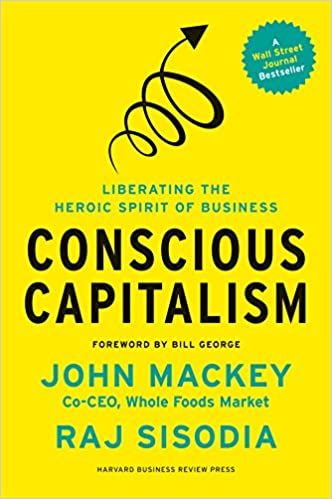
Written by Whole Foods CEO John Mackey, Conscious Capitalism proves that capitalism is not the enemy of ethics, but rather, that the two concepts can work side by side. This exploration shows how business can better the world and still serve stakeholders, and highlights major companies who have achieved massive success that was not won at the expense of employees or the environment. The book lays down a blueprint for practicing responsible capitalism by focusing on four main principles: higher purpose, stakeholder integration, conscious leadership, and conscious culture and management. The text teaches readers how to build a positive culture and community, find stakeholders who share the same values, and model ideals through the example of leadership. Conscious Capitalism urges entrepreneurs to pursue a noble purpose and chase a more holistic vision of success beyond pure profit.
Notable Quote: “I realized that with everything I did from that point onward, I would have to ask myself this question: “How would I feel if what I’m doing right now is written up on the front page of the Wall Street Journal or the New York Times or if it is on television? Would I still do it?” That is a very useful exercise for leaders to engage in, because we shouldn’t do anything we might be embarrassed by or ashamed of.”
Read Conscious Capitalism.
2. Conscious Leadership: Elevating Humanity Through Business by John Mackey, Steve Mcintosh, and Carter Phipps
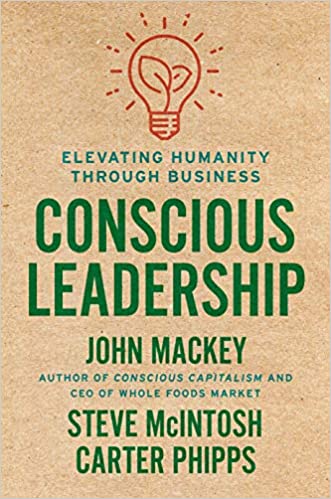
Conscious Leadership is one of the best new corporate ethics books. In this book, John Mackey expands upon the ideas set forth in Conscious Capitalism with an emphasis on leadership duties. Divided into three sections– vision & virtue, mindset & strategy, and people & culture– the text explains how leaders can shape their company’s narrative while bringing out the best in their people. The pages prove that rising in the ranks does not have to come at the expense of employees and that leaders have a duty to serve their reporting team members. Conscious Leadership is a call to action for ethical leadership and a how-to for having maximum positive influence within an organization.
Notable Quote: “Conscious leaders infuse their organization’s purpose with authenticity and meaning. They make it come alive, in little ways and big ways, every day. Their passion for purpose can become a touchstone for those around them. They demonstrate and embody the “why” of an organization. And they show a reasonable pathway to “how.”
Read Conscious Leadership, and check out this list of leadership books and these traits of a good manager.
3. Speed of Trust: The One Thing That Changes Everything by Stephen M .R. Covey
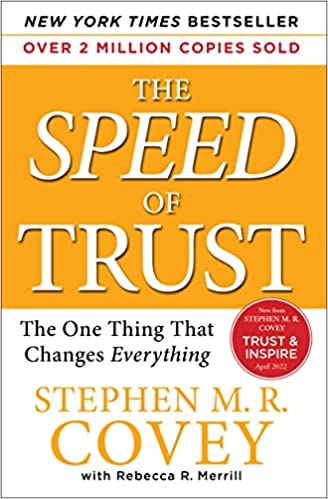
Speed of Trust is a meditation on the importance of trust in business. Acclaimed motivational business author Stephen M. R. Covey explains how success in the business world is dependent on earning and keeping trust. Confidence impacts who is willing to work with us and how quickly we can grow. The book outlines the four cores of credibility, names behaviors that prove transparency and reliability, and gives advice on how to earn the trust of different types of collaborators. The text gives tips on overcoming reluctance and skepticism and signaling that you care about the other party’s best interests. Speed of Trust teaches a masterclass on earning faith and following through on promises, and winning cooperation in the process.
Notable Quote: “Above all, success in business requires two things: a winning competitive strategy, and superb organizational execution. Distrust is the enemy of both. I submit that while high trust won’t necessarily rescue a poor strategy, low trust will almost always derail a good one.”
Read Speed of Trust.
4. Ethics 101: What Every Leader Needs To Know by John C. Maxwell
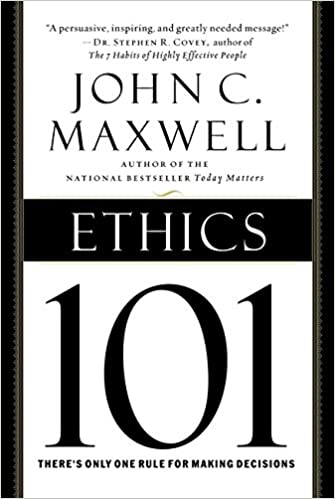
Ethics 101 is one of the best business ethics books for beginners. John C. Maxwell boils down business ethics to a basic set of principles revolving around the golden rule. The pages lay out behaviors to avoid, and present business ethics rules in the simplest and most easily digestible format. The book shows that professional ethics are not universally complicated, but are often a matter of sticking to guidelines and principles. Ethics 101 presents a breakdown of what it means to operate honorably in the modern business world, especially as a leader.
Notable Quote: “There are really only three kinds of people. Those who don’t succeed, those who achieve success temporarily, and those who become and remain successful. Character is the only way to sustain success.”
Read Ethics 101.
5. Honest Work: A Business Ethics Reader by Joanne B. Ciulla, Clancy Martin, and Robert C. Solomon
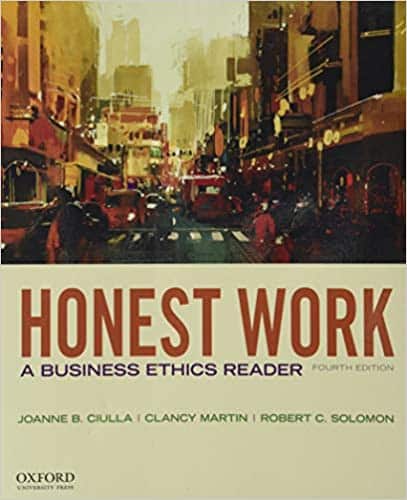
Honest Work is one of the most helpful business ethics textbooks. The guide provides a comprehensive introduction and overview of the concepts and is full of concrete examples of real-world dilemmas and case studies. This text has been around for decades, yet has been updated to include more modern issues such as technology and issues surrounding the global financial crisis of the early 2000’s.
Notable Quote: “Designed for undergraduate, graduate, and executive business ethics courses, Honest Work: A Business Ethics Reader demonstrates that business ethics is primarily about the ethics of individuals. With a unique focus on the personal dimension of ethics, it challenges students to consider the relationship between the ways in which people do business and the kind of lives they want to live.”
Read Honest Work: A Business Ethics Reader.
6. Grow the Pie: How Great Companies Deliver Both Purpose and Profit by Alex Edmans
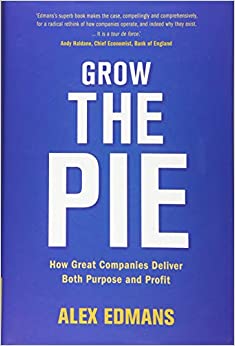
Grow the Pie is one of the best books on business values. This work proves that profit and ethics can work in harmony, and, in fact, organizations that stay true to their ideals tend to outlast and outperform less trustworthy companies. The author insists that business can improve life quality and still profit, and gives advice on how to achieve this goal. The book provides tips on which types of projects and offers to pass on, how to reward long-term growth over short-sighted wins, and partnering with investors that help leaders stay on track with the core mission. The book also gives advice on how to scale this kind of ethical management and proves that small businesses are not the only organizations that can have a conscience.
Notable Quote: “To reach the land of profit, follow the road of purpose.”
Read Grow the Pie.
7. The Business Ethics Field Guide: The Essential Companion to Leading Your Career and Your Company to Greatness by by Bill O’Rourke, Brad Agle, and Aaron Miller
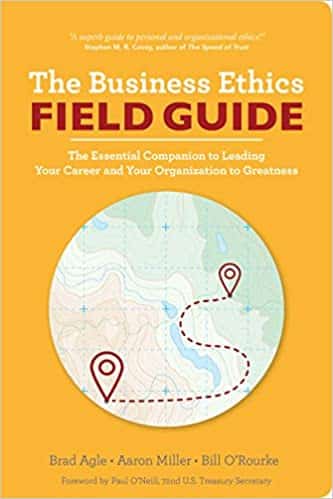
The Business Ethics Field Guide is one of the most helpful business ethics reference books. The guide explores the common clashes between individual vs organizational values, and outlines ways to proceed when these ideals conflict. The authors identify thirteen types of common ethical dilemmas and provide philosophical background for the different methods of approaching these issues. The book advocates for moral intelligence as an essential leadership and management skill and points out ways to build this competency. The format of the book makes it easy to find and follow along with specific situations, making the text a handy resource for business leaders looking for guidance in the early stages of crises.
Notable Quote: “Ethical decision making skills are every bit as critical to organizations as strong management and leadership skills. ”
Read The Business Ethics Field Guide.
8. Intentional Integrity: How Smart Companies Can Lead an Ethical Revolution by Robert Chesnut
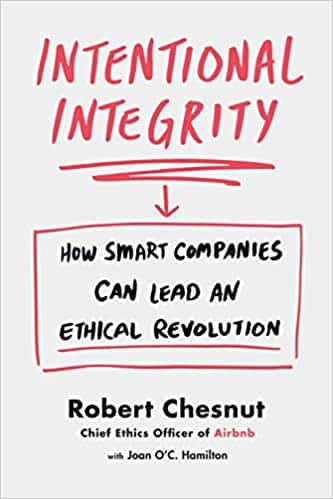
Intentional Integrity is a call to action for organizations to hold employees and other companies accountable. Robert Chesnut, Chief Ethics Officer at Airbnb, describes a six step process leaders can use to foster a culture of integrity. Drawing on personal anecdotes and studies of outside companies, Chestnut identifies key moments in defining the soul of the brand which he deems “Code Moments.” The book presents a set of guidelines to challenge enemies of integrity, and best practices for building a work world that prioritizes doing good and doing harm. The text advocates for being an ally and calling out problematic behavior in productive ways. This guide not only encourages leaders and employees to shape the ideals of their own organizations, but also to set a standard that raises industry ethics and compels competitors to comply. Intentional Integrity challenges professionals to refuse to choose the easy way out and to challenge everyone in their midst to be better.
Notable Quote: “The leader of any company, for that matter any sole proprietorship, must shoulder responsibility for thinking through its purpose, its values, and the basic rules of its interactions with stakeholders and then commit to act on those values.”
Read Intentional Integrity.
9. Net Positive: How Courageous Companies Thrive by Giving More Than They Take by Andrew S. Winston
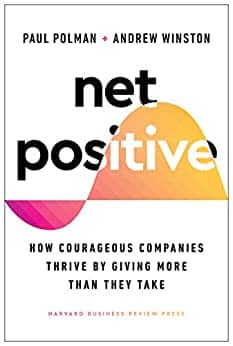
Net Positive is one of the best new corporate ethics books. The book challenges the notion that underhanded tactics win out in the business world and argues that organizations with a strong conscience benefit in the long run more than shady or short sighted operators. Andrew Winston defines the idea of a “net positive” company and gives businesses an example to aspire to. The guide describes the type of business that takes accountability for its actions and consequences, cooperates with outside organizations to drive change, and improves the wellbeing of those within its influence. The chapters spell out instructions for becoming this kind of organization and lay out ethical etiquette for building a company that actually does change the world for the better.
Notable Quote: “All businesses now face a profound choice: continue pursuing the shareholder-first model that forces shortsighted decisions, hurts business, and endangers our collective well-being…or build businesses that grow and prosper over the long haul by serving the world– that is, by giving more than they take.”
Read Net Positive.
10. Defining Moments: When Managers Must Choose Between Right and Right by Joseph L. Badaracco Jr.
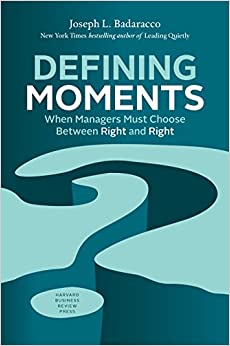
Defining Moments is an exploration of the critical choices managers often face. The book pinpoints “defining moments” as junctures when managers must choose between job responsibilities and personal values. The author provides a framework for leaders to balance between advancing their careers without sacrificing too many of their ideals, and provides a handbook for making tough decisions. The book shows that leadership choices are not simply a matter of black-and-white good-vs-evil, and that managers must be able to evaluate consequences and choose a direction even when there is fallout involved in the choice. Defining Moments is the ultimate guide for embracing the realities and responsibilities of leadership and choosing the greater good when good-for-all is not an option.
Notable Quote: “Right-versus-right issues are troubling, complicated, and serious. They are also too important to ignore. Good people in management jobs must sometimes make very hard choices. At issue is what it means to be a successful manager and a thoughtful, responsible human being.”
Read Defining Moments, and check out this list of books for managers and new manager books.
11. Business Ethics by Stephen M. Byars and Kurt Stanberry

Business Ethics by Stephen M. Byars and Kurt Stanberry is one of the best introductory business ethics textbooks. This title is a project from OpenStax, a Rice University program to provide quality learning materials for students with limited resources. The book provides a comprehensive overview of the topic without a hundred-dollar-plus price tag. Content includes meditations on the importance of ethics, historical context, ways to honor stakeholders, and the effects of industrial and societal shift on professional ethics. The text also analyzes ethics in particular industries and outlines what employees and employers owe each other. Business Ethics is one of the best starter texts for workplace ethics and gives learners a firm foundation to build upon.
Notable Quote: “Each of us makes innumerable decisions every day. In a business context, these choices have consequences for ourselves and others whom we must take into account in our decision-making process.”
Read Business Ethics.
12. Business Ethics: Best Practices for Designing and Managing Ethical Organizations by Denis Collins
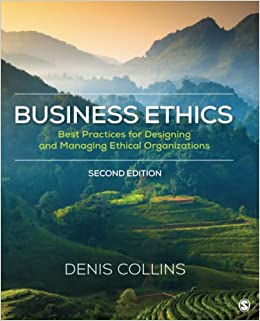
Business Ethics by Denis Collins is one of the most helpful business ethics reference books. This textbook shows how to build a company culture of integrity that encourages employees to behave morally and that discourages ethical risks. The text outlines the costs of indiscretions, shows how to incorporate behavioral standards into training and onboarding, defines terms, describes best practices, and reflects on ethics in terms of diversity and inclusion. The pages also present a series of dilemmas and case studies that help readers better understand these concepts and see theories in action. Business Ethics covers the full range of the topic and helps readers understand the basics as well as the nuances of professional conduct. Most importantly, the book shows that ethics is not merely a matter of individual choice but also about creating a social system that rewards ethical behavior and prevents abuses.
Notable Quote: “Ethics would be easy to manage if it were simply a matter of detecting and dismissing evil people. But that is not the nature of life in organizations. Most employees are good people; otherwise, they would be in jail rather than being employed. Nonetheless, good people occasionally make ethical mistakes, which at times can be costly for an organization.”
Read Business Ethics, and check out this list of organizational behavior books.
Final Thoughts
In an age where consumers are increasingly calling for corporate responsibility, business ethics is more important than ever. Having a strong moral foundation helps leaders make decisions that benefit customers, employees, leadership, and the future of the company instead of skewing solely towards self interest. In an interconnected, global world, it is important for professionals to consider the effects of actions before making decisions. Often, leaders need to make tricky calls, and a firm business ethics education can act as a moral compass to minimize harm and maximize positive outcomes.
Contrary to popular belief, ethics does not undermine business operation, but actually supports it. Companies that fail to maintain or earn back consumer trust or that mistreat employees are poised for disruption by more conscientious competitors. Workplace ethics books teach how to behave honorably towards customers, employees, and competitors while still being personally ambitious, serving investor interests, and boosting the bottom line. These books prepare professionals to face dilemmas on paper to be better equipped to handle these obstacles in person.
Next, check out this list of books on diversity and inclusion and this list of HR books.
